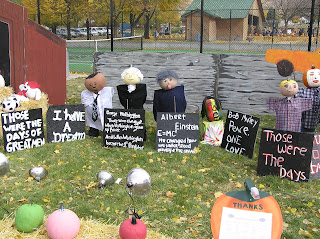
One point that stuck out to me (perhaps since I had recently read Wiley's report to the Secretary of Education) was Friedman's tenth flattener, The Steroids. These are new technologies that amplify and turbocharge all the other flatteners, making collaboration possible in a "digital, mobile, virtual, and personal" way. Wiley extends and slightly changes that list to digital, mobile, connected, personal, open, and participative. The specific technologies that Friedman lists as steroids are increasing computing and storage, IM and file sharing, VoIP, videoconferencing, computer graphics, and wireless. Since the book was written, wikis and blogs and exploded in popularity and Google has popularized online office productivity software. If I'm writing in my blog or working on a googledoc, and I have to go somewhere, I just close my browser and walk away, and I can pick up where I left off on any other computer. If you don't want to keep all your information online, you can install OpenOffice and Firefox or even an entire operating system (Linux) on a USB drive and carry your OS, programs, and documents with you. You'll notice it's the open source software that can be carried around. A few years ago, I remember seeing someone that got Windows 98 running on a CD through a painstaking process. The latest versions of Windows would make it even more difficult to accomplish something like that because of DRM and because of the bloat that would make them too large, but it doesn't matter, because the OS and office productivity software are becoming irrelevant, just as printed syllabi, textbooks, and DRM-protected, non-open content are becoming irrelevant. We are becoming used to being able to collaborate online from anywhere, and the classroom should be no different.
Something else that got me thinking, as I've been reading lately about open source, open content, copyright, and licensing mechanisms, was when Friedman talked about Japan and China working together. Even with the bitter feelings the Chinese still have towards the Japanese who occupied their country and used biological weapons to kill millions of Chinese, the Japanese are outsourcing to China. The economics override the hate. That made me wonder if at some point we'll see some collaboration among Richard Stallman, Larry Lessig, Steve Ballmer, Tom Giovanetti, and Marilyn Bergman. Stallman's and Lessig's licenses, GFDL and CC, don't currently work together even though they're on the same team. The software and recording industries seem pretty much united in their opposition to anything being open, although Ballmer does claim that he likes to see open source development happen using Microsoft products. If Lessig and Stallman can't present a united front, however, how will anyone be able to withstand the attack from the MPAA/RIAA/ASCAP/Orrin Hatch/Microsoft front?
Friedman points to the Apache project as a good example of how development could happen using an open foundation. IBM worked with Apache to ensure those using Apache would be legally protected and able to use Apache for free. Anyone can now use Apache as a base to build more free stuff, just the same as they can use it as a base to serve up commercial services. He gives the mash-up example of realtors combining Google Maps with Craigslist to produce an always-current map of houses and apartments for sale or rent in a certain city. The businesses that will survive the outsourcing of many common tasks, according to Friedman, are the ones that localize, defined by Joel Cawley of IBM as "[taking] all the global capabilities that are now out there and [tailoring] them to the needs of a local community." One of the important functions of the OER movement is in providing resources available to anyone that are compatible with technological and legal frameworks that allow localization.



